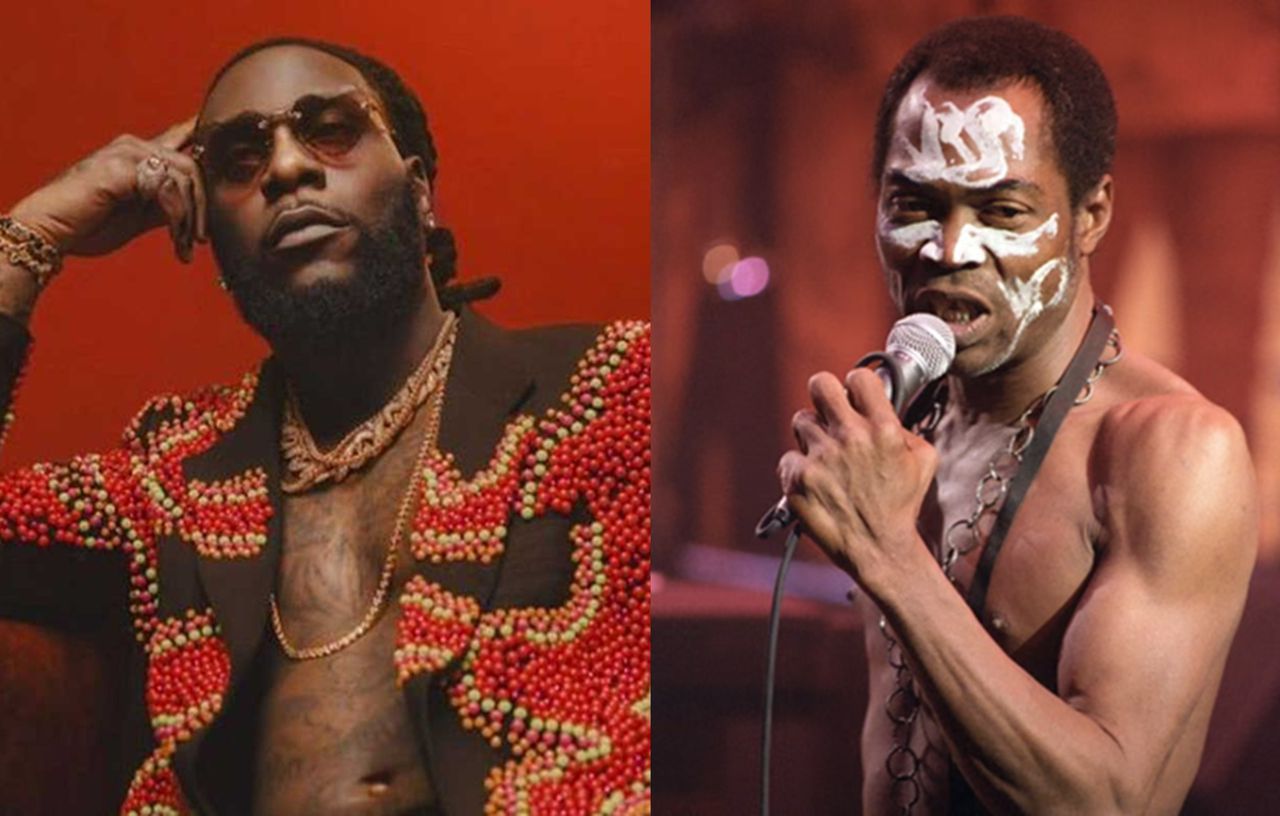
“Only Fela Anikulapo Kuti Is Greater Than Me” — Burna Boy Sparks Debate with Bold Declaration

In a world where confidence and controversy often walk hand in hand, Burna Boy has once again ignited a storm of conversations across social media and beyond. The Grammy-winning Nigerian superstar, known for his larger-than-life persona and outspoken views, recently made a statement that has stirred both admiration and criticism in equal measure. During a recent interaction, Burna Boy declared, “Only Fela Anikulapo Kuti is greater than me,” a proclamation that has sent shockwaves through the Nigerian music scene and rekindled age-old debates about legacy, greatness, and the true heirs of Afrobeat.
For Burna Boy, whose real name is Damini Ebunoluwa Ogulu, confidence is not new. He has often positioned himself as a revolutionary figure in modern African music, blending Afrobeat, dancehall, reggae, and pop in a way that commands both international appeal and cultural authenticity. But this new claim — placing himself just beneath the legendary Fela Kuti — feels like the boldest of all his self-assessments yet. Many fans see it as a natural declaration from an artist who has worked tirelessly to put Nigerian music on the global stage. Others view it as an audacious act of self-comparison, considering Fela’s immense legacy as a musical prophet, activist, and symbol of defiance.
Social media platforms erupted within minutes of Burna’s statement surfacing. On X (formerly Twitter), hashtags like #BurnaBoy and #Fela quickly began trending, with thousands of users weighing in. Some fans defended Burna’s claim, citing his groundbreaking achievements — from winning the Grammy Award for Best Global Music Album in 2021 for Twice As Tall, to selling out iconic venues such as Madison Square Garden, London Stadium, and the State Farm Arena in Atlanta. They argue that Burna Boy has done what few African artists have achieved: merging African consciousness with Western recognition while staying unapologetically Nigerian. To them, he is not only Fela’s successor but the torchbearer who has brought Afrobeat to the world’s mainstream consciousness.
However, others have not taken the statement so lightly. Critics have called it “ego-driven” and “disrespectful” to the many other Nigerian legends who came before him. Names like King Sunny Ade, 2Baba, Femi Kuti, and even Wizkid and Davido were invoked in the debate, with many arguing that greatness is not measured solely by global fame or awards, but also by humility, consistency, and cultural impact. Some believe that while Burna Boy is undoubtedly one of Africa’s finest exports, the comparison to Fela Kuti — who not only revolutionized music but also risked his life fighting military oppression — is a stretch too far.
It’s not the first time Burna Boy has referenced Fela or drawn parallels between their lives. The singer, who has repeatedly described himself as Fela’s “spiritual son,” often infuses his songs with the same social consciousness and Pan-African themes that defined Fela’s work. Tracks like Monsters You Made, Collateral Damage, and Another Story mirror Fela’s style of using music as a weapon against corruption, oppression, and ignorance. Burna Boy has also paid musical homage to Fela through samples, performances, and fashion, adopting the Afrobeat pioneer’s defiant energy and unapologetic pride in African identity.
Still, there is a stark contrast between the two artists. Fela Anikulapo Kuti was more than a musician — he was a movement. He founded the Kalakuta Republic, challenged Nigeria’s military regimes head-on, and endured multiple arrests and beatings for his unyielding stance against injustice. His music was rebellion turned rhythm, his lyrics a manifesto for African liberation. To many, comparing oneself to Fela is not just about musical skill, but about embodying the spirit of fearless activism that defined him. Critics say that while Burna Boy borrows Fela’s sound and message, he hasn’t lived through the same level of personal sacrifice that made Fela’s art immortal.
Nonetheless, Burna’s statement also reflects the evolution of Nigerian music and how far the industry has come. When Fela was alive, Afrobeat was a symbol of resistance within Nigeria and among Pan-African circles. Today, under Burna Boy and his peers, it has become a global export — filling stadiums across continents, breaking into Billboard charts, and earning Grammy recognition. The transition from protest to prominence shows a new kind of power: one that uses influence and visibility to reshape narratives about Africa. Burna’s audacious statement might therefore be seen not merely as arrogance, but as a declaration of generational pride — a reminder that Africa’s new icons now stand shoulder to shoulder with the world’s biggest stars.
In interviews, Burna Boy has often emphasized that his confidence comes from his awareness of African greatness. He once said, “I’m not the African Giant because I’m better than anyone, but because I represent something bigger than myself.” Yet, that same self-belief has frequently landed him in controversies. From claiming he paved the way for other Nigerian artists abroad to criticizing fans for misunderstanding his messages, Burna Boy remains a figure who divides opinions while commanding respect. His artistry and achievements are undeniable — but his words, as always, invite intense scrutiny.
What remains certain is that Burna Boy’s comparison to Fela will continue to fuel debates for years. Whether seen as blasphemy or boldness, it forces the public to revisit how greatness is measured in the modern era. Is it by awards, activism, influence, or impact? In an age where social media amplifies every statement and achievement, artists like Burna Boy constantly walk a fine line between self-celebration and perceived arrogance. Yet, it is that very confidence — the conviction that he is second only to Fela — that perhaps defines Burna Boy’s unstoppable rise.
Fans who admire Burna’s courage argue that the statement should be understood symbolically. They believe Burna isn’t claiming to equal Fela’s political activism but rather acknowledging Fela as his only true musical predecessor — the only artist whose legacy still shapes his creative identity. “He’s not saying he’s Fela,” one fan posted, “he’s saying he’s the next in line — and honestly, who else fits that description?” Others disagree, insisting that greatness cannot be self-proclaimed but must be conferred by time, culture, and collective memory.
As the debate rages, Burna Boy seems unfazed. He has built a career on being unapologetic, and this moment only adds another layer to his mythos as the most polarizing yet impactful artist of his generation. Whether his words will age as confidence or conceit remains to be seen, but one thing is clear — Burna Boy has once again succeeded in making the world talk about him and, by extension, about Nigerian music.
In a single sentence — “Only Fela Anikulapo Kuti is greater than me” — Burna Boy has positioned himself not just as a musician but as a contender in the ongoing story of African legacy. For some, it’s a statement of pride; for others, a provocation. But in true Burna Boy fashion, it is undeniably loud, daring, and unforgettable — much like the man himself.


